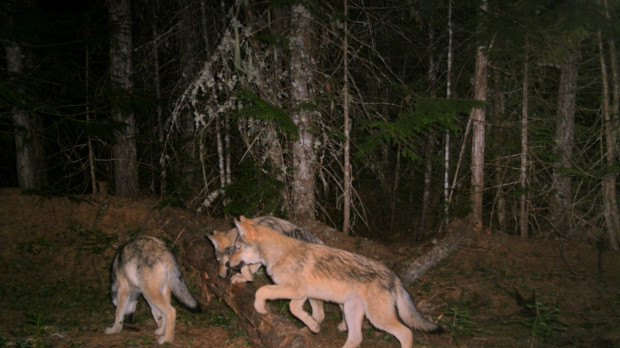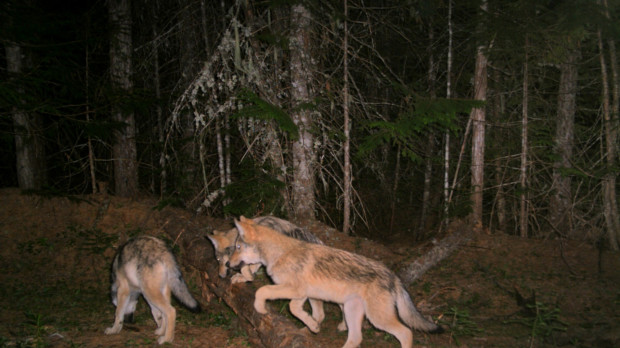
Its not Rocket Science, Martorello has proven Dr Wielgus Study Correct. Killing wolves one year only leads to more depredation the following year, ODFW have seen the same problem and have helped to prove the study accurate. When will our Wildlife Managers begin to manage wildlife in the best interest of the Public and not the Rancher.
Northwest states have struck a compromise between preserving wolves and preventing livestock damage. Scientific evidence suggests it’s an approach that will fail both wolf survival and ranchers.
The long hunt finally paid off on the night of Aug. 6 for two employees of the Oregon Department of Fish and Wildlife. They’d spent a combined 85 hours and driven 752 miles in pursuit of the Harl Butte wolf pack in the northeast corner of the state.
They had already come close, spotting wolves twice but never firing a shot.
But finally, on a Saturday evening, they killed a young male. Two days later, a Fish and Wildlife employee fired a kill shot from a helicopter while patrolling the rolling forests and pastures. This time it was a young female.
The wolf-killing mission was meant to halt a pack that was helping itself to ranchers’ livestock.
It won’t work, thought Todd Nash. He and other local ranchers wanted the whole pack gone.
“If there was a gang in downtown Portland and there was 13 of them and you randomly took two, you didn’t know if they were the ringleaders or what they were … would you expect to have a positive outcome?” Nash said.
It turned out Nash was right; it didn’t work.
Weeks later, some of the Harl Butte pack’s surviving wolves tore into a 450-pound calf. It was found dead in a pasture Nash leases, with bite marks across its legs, flanks and hocks.
So Oregon wildlife officials killed two more wolves. Weeks later, they said the depredations had stopped.
They hadn’t. The Harl Butte pack struck again in late September, killing a 425-pound calf.
As the number of wolves in Oregon and Washington has grown, wildlife managers are increasingly turning toward lethal tactics to keep them away from ranchers’ livestock. State governments in the Northwest now spend tens of thousands of dollars to kill wolves that prey on cattle and sheep.
Northwest Wolf Populations
The number of wolves has grown rapidly since they first returned to Northwest states. As their numbers grow, the likelihood increases of encounters with cattle and sheep.
State wolf managers are walking a tightrope: growing and sustaining a population of wolves while limiting the loss of livestock for the ranchers who make their living where the predators now roam.
Managing wolves in the West is as much about politics, economics and emotion as it is about science.
“Sometimes you view it as being between a rock and a hard place, or being yelled at from both sides,” said Derek Broman, carnivore and furbearer coordinator for Oregon Fish and Wildlife. “I like to say it’s balance.”
To balance the costs of killing wolves, ecological needs and the concerns of ranchers and advocates, it’s the policy of both Oregon and Washington to kill wolves incrementally — one or two at a time. But in making that compromise between preserving wolves and preventing livestock damage, they’ve taken a course of action that scientific evidence suggests could achieve neither.
Policies and practices in both states go against a growing body of research casting doubt on the overall effectiveness of killing predators.
Neither state follows recent recommendations from top researchers that their efforts to control predators be conducted as well-designed scientific studies. And neither follows the primary recommendation from the research most often used as evidence, which found killing most or all of a pack is the most effective form of “lethal control” to reduce ranchers’ damages.
Instead, some scientists and advocates say, Oregon and Washington are risking harm to the Northwest’s wolf population without ever reducing predation on cattle and sheep.
“Oregon and Washington may be playing with fire in their incremental control approach,” said professor Adrian Treves, who founded the Carnivore Coexistence Lab at the University of Wisconsin. “Not only is there very little evidence for the effectiveness of lethal methods, but there are more studies that find counterproductive effects of lethal control, namely that you get higher livestock losses afterward.”
Northwest wildlife managers say they use lethal control, in part, to increase people’s willingness to tolerate wolves. Treves said there’s little data to support that it’s actually helping shape public opinion to accept wolf reintroduction. In fact, Treves has published research suggesting otherwise: that government-sanctioned killing of wolves may actually embolden individuals to illegally do the same.
Policies under scrutiny
In 2016, Treves was part of a team that published a paper concluding common methods of both lethal and non-lethal predator control were sorely lacking the support of gold-standard scientific evidence. Since 2016, three other papers — independent of each other — found strikingly similar results.
He and others have called on governments to re-evaluate their predator control policies. Treves was also one of multiple scientists who filed comments with the Oregon Department of Fish and Wildlife, saying his research and others’ had been misinterpreted in the state’s revision of its wolf management plan, which Treves and others criticized for being biased in favor of lethal control.
“It’s just like (when) the government is putting a medicine out there; it needs to prove the medicine is effective,” Treves said. “ Because there are costs. And not just financial. Animals are dying.”
Lethal control policies in both Oregon and Washington are getting pushback from wolf advocates.
In Oregon, multiple groups have called on Gov. Kate Brown’s office to intervene. The governor’s office has not publicly responded and did not respond to requests for comment.
In Washington, two environmental groups filed a lawsuit in September claiming the state’s approach to killing wolves is unnecessary and that its protocols do not satisfy Washington’s State Environmental Policy Act.
Donny Martorello, wolf coordinator for Washington Fish and Wildlife, said the state has seen mixed success with lethal control.
“We’ve had situations where we’ve initiated lethal removal and had to stay with it for quite a period of time. Removing more and more wolves because the conflict kept going and going and going,” he said. In other cases, he said, it seemed to work well.
Martorello said the decision to kill wolves to is not about decreasing long-term livestock losses. It’s about intervening in an escalating situation, where prevention has failed and a rancher’s cattle or sheep are dying.
“We turn to lethal control as a last resort,” Martorello said. “When we remove wolves it is trying to change the behavior of wolves in that period of time. We can’t extend that to say that will prevent negative wolf-livestock interactions in the long term. Because it doesn’t.”
In its lethal control protocol, WDFW cites a paper from Michigan saying the “the act of attempting to lethally remove wolves may result in meeting the goal of changing the behavior of the pack.”
However, that study’s authors do not make claims about changing behavior, and attribute any lower recurrence of attacks on livestock to the increase in human activity nearby — not anything specific to lethal control.
That study also found no correlation between killing a high number of wolves and a reduction in livestock depredation the following year.
Instead, it found the opposite: “Our analyses of localized farm clusters showed that as more wolves were killed one year, the depredations increased the following year.”
Source: As Northwest States Kill Wolves, Research Casts Doubt On Whether It Works . News | OPB

Comments
Here’s a solution: Kill all the fucking livestock. Problem solved.